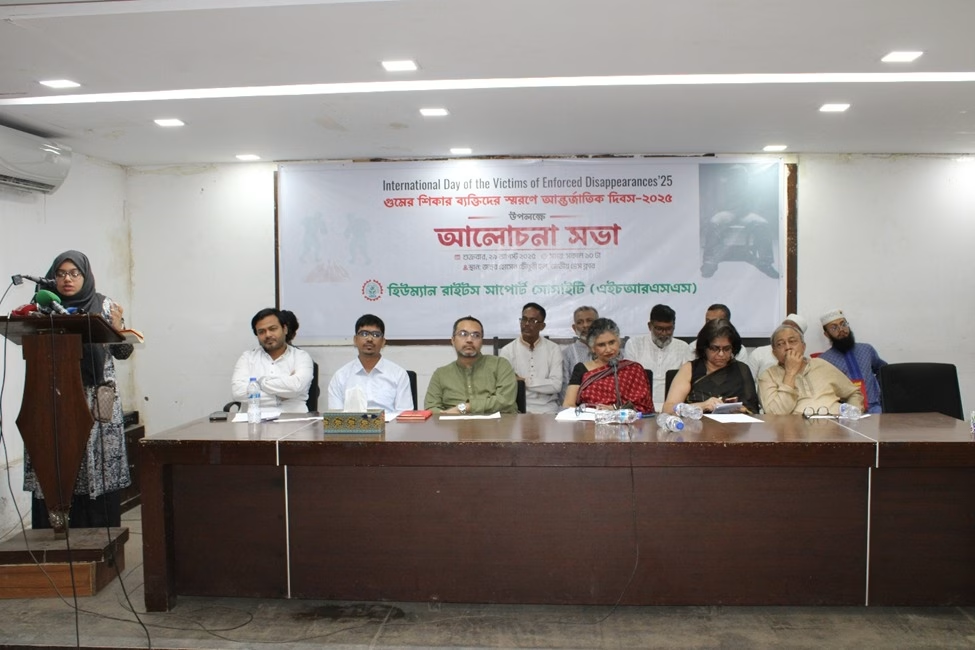Jurists, rights activists and victims on Friday called for a political willingness to end enforced disappearances, killings and human rights violations in Bangladesh.
Over 1,000 people were the victim of enforced disappearance during the regime of the Sheikh Hasina-led government, who used it as a tool to suppress any voice with an iron fist to cling on power, they said.
Denouncing the infamous action by Sheikh Hasina, who ultimately fled to India after her fall amid a mass uprising, the speakers said such an act is no way acceptable in a democratic country.
The Human Rights Support Society organised the discussion in the capital, marking International Enforced Disappearance Day ‘25.
“We do not want to experience any incident of enforced disappearances and extra judicial killings any more. To achieve the goal, a political will is a must,” lawyer Sara Hossain said while addressing a seminar at the Jatiya Press Club in the capital.
Putting an emphasis on ensuring justice, she said, “The country will not move a single inch by only punishing the wrong doers. People do not want such a judiciary which is used for injustice or personal gain.”
Huma Khan, a senior human rights adviser of the UN Coordination Office in Dhaka, expressed deep concern over Bangladesh’s draft law on enforced disappearances.
She harshly criticised some provisions of the draft for narrowly defining enforced disappearances as an act carried out only by only government officials.
“Individuals can also commit disappearances on the instructions of government officials, and the state will still bear responsibility,” she said.
She also opposed provisions limiting accountability to internal departmental measures, highlighting the trauma faced by families and the need for the law to focus on state responsibility.
She urged authorities not to rush the legislation and to consult extensively with victims and their families.
Nur Khan Liton, member of the Enforced Disappearances Investigation Commission, stated, “The commission is still working. Many cases related to enforced disappearances will be resolved by December.”
Enforced disappearance survivor Michael Chakma stressed the need for eradicating the culture of disappearances permanently, noting that “one year has passed in this government’s tenure, yet justice has not been delivered.”
He called for the arrest of those involved in the “Ayna Ghar” case and urged the commission and the government to make it accessible to the public.
Mahdi Amin, adviser to BNP leader Tarique Rahman, highlighted that during 15 years of the government, thousands were killed or went missing due to government policies and political violence.
According to BNP data, at least 4,771 party activists were killed, and millions were sued in false cases.
Amin promised that BNP will uphold human rights, law and order, and freedom of speech in the future, providing support to the families of martyrs and disappeared individuals.
Ariful Islam, joint convener of the National Citizen Party (NCP), accused intelligence agencies, including DGFI, NSI and DB, of targeting political opponents and ordinary citizens instead of ensuring public safety.
He has called for justice for those responsible for killings, emphasising that attempts to manipulate power through old cycles must end.
The discussion also highlighted individual cases of enforced disappearances.
Thirteen years ago, Hafez Zakir Hossain, a leader of Islami Chhatra Shibir, was picked up from his mess in Mohammadpur by RAB personnel. His family continued to demand his whereabouts.
Another case was filed against Mahidul Islam in Nilphamari in connection with an attack on Asaduzzaman Noor’s convoy. His body was later recovered from Bogura and his brother has demanded trial for his killers.
According to HRSS data, hundreds have gone missing over the past decade, many still untraced.
The organisation stressed that strengthening the recently formed investigation commission is critical for ensuring justice.
The HRSS has outlined seven key demands such as effective implementation of the International Convention for the Protection of All Persons from Enforced Disappearances.
It also demanded to promptly provide families with information about the missing and ensure fair investigations to hold perpetrators accountable.
The HRSS has urged authorities to strengthen the investigation commission, making it effective and permanent and provide legal, financial, and psychological support to victims and their families.
The demands also include allowing families of the long-term missing to access bank accounts and assets and ensuring accountability of law enforcement agencies through parliamentary oversight and mandatory human rights training.


